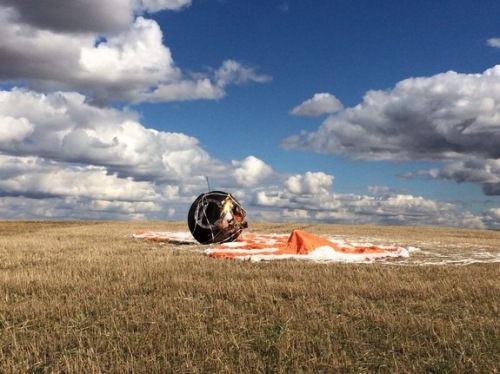
(Russia’s Foton M4 satellite shortly after landing – Photo Credit: Roscosmos)
Roscosmos have confirmed that five gecko lizards sent into orbit on a Russian Foton-M4 satellite have all died. Although the cause of death has not yet been determined, experts are speculating that an anomaly that occurred during flight could be to blame for their demise.
The satellite successfully returned to Earth on Monday, landing in a predetermined area of the Orenburg region. However, after opening the vehicle, it was revealed that the small reptiles didn’t survive their trip into space as part of a study to investigate the effect of weightlessness on their sex lives and development.
Researchers still aren’t sure when or how the geckos died, however an official from Russia’s Institute of Medical and Biological Problems announced: “We can say with confidence that they died at least a week before the landing because their bodies were partly mummified”.
 (One of the geckos used in the experiment pictured before launch – Photo Credit: Roscosmos)
(One of the geckos used in the experiment pictured before launch – Photo Credit: Roscosmos)
Experts are speculating that the geckos may have frozen to death after the satellite’s heating system broke down when it malfunctioned early in its mission. The Foton, carrying the geckos, was launched to space on July 18, however soon after, Roscosmos lost contact with the satellite. The vehicle stopped responding to commands from Roscosmos and failed to lift itself into a higher orbit.
Luckily, mission controllers re-established contact with the animal-filled spacecraft, however the malfunction could have left the reptiles without their life support systems for a number of days, leading to their death.
Although the five geckos didn’t survive, the spacecraft did manage to keep a group of flies alive. Drosophila fruit flies that were also travelling on the satellite survived and had even reproduced.
Roscosmos will now perform investigations into the animal’s deaths to determine the exact cause.